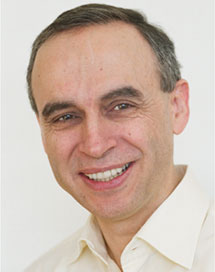 Professor Nikolaus Pfanner from the Institute for Biochemistry and Molecular Biology, University of Freiburg, Germany, will deliver the 2014 Feldberg Prize Lecture on Thursday January 23rd at 4.15pm in the LMB’s Max Perutz Lecture Theatre. The title of the lecture is “The mitochondrial machinery for transport and assembly of proteins.” The lecture is open to anyone locally who is interested in attending.
Professor Nikolaus Pfanner from the Institute for Biochemistry and Molecular Biology, University of Freiburg, Germany, will deliver the 2014 Feldberg Prize Lecture on Thursday January 23rd at 4.15pm in the LMB’s Max Perutz Lecture Theatre. The title of the lecture is “The mitochondrial machinery for transport and assembly of proteins.” The lecture is open to anyone locally who is interested in attending.
Nikolaus studied medicine at the University of Munich and completed his M.D. there in the Institute of Physiological Chemistry in 1985. He did postdoctoral research at the University of Munich before moving to Princeton University as a research fellow. In 1992, he became professor and chair of the Institute of Biochemistry and Molecular Biology, University of Freiburg. He was President of the German Society for Biochemistry and Molecular Biology (GBM) from 2009-2011.
Nikolaus is currently interested in the biogenesis of mitochondria and the mechanisms of intracellular protein transport and assembly.
Lecture Abstract:
Mitochondria are essential for cell viability. They function as powerhouses and play crucial roles in cellular metabolism and signaling. Mitochondria contain more than 1,000 different proteins. Most proteins are synthesized as precursors in the cytosol and are imported by the translocase of the outer mitochondrial membrane (TOM). Biogenesis and function of the TOM complex are regulated by cytosolic protein kinases.
After passing through the TOM complex, the precursor proteins follow different intramitochondrial sorting pathways: (i) the presequence pathway to the matrix and inner membrane; (ii) the carrier pathway to the inner membrane; (iii) the MIA (mitochondrial intermembrane space assembly) pathway to the intermembrane space; and (iv) the beta-barrel pathway to the outer membrane via the SAM complex (sorting and assembly machinery). Additionally, (v) several alpha-helical outer membrane proteins bypass the TOM channel and use the Mim1 complex for insertion into the outer membrane.
The protein translocases are coupled to machineries that maintain the shape of mitochondria. TOM and SAM of the outer membrane form contact sites with a large protein complex of the inner membrane that is required for maintenance of the characteristic shape of the inner membrane.
The seminar will discuss the mechanisms of import of mitochondrial proteins and the integration of protein import into a network of machineries that control biogenesis and architecture of mitochondria.
The Feldberg Prize
In 1961, Professor Wilhelm Feldberg, CBE, FRS, established the Feldberg Foundation to promote scientific contact between German and English scientists within the sphere of experimental medical research. Each year a German and British scientist, acknowledged according to Feldberg’s wishes as outstanding in their particular field, are awarded the Feldberg Prize. Each recipient gives a prize lecture in each other’s country.